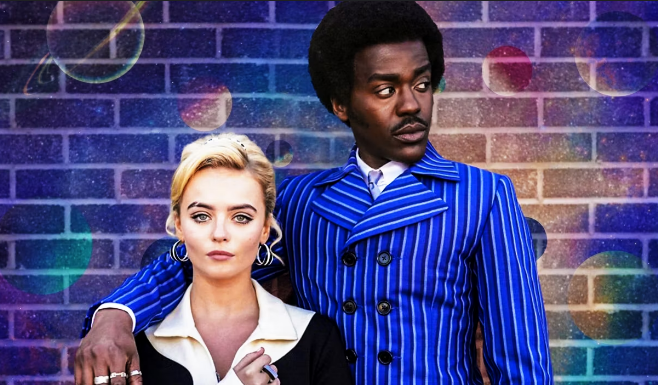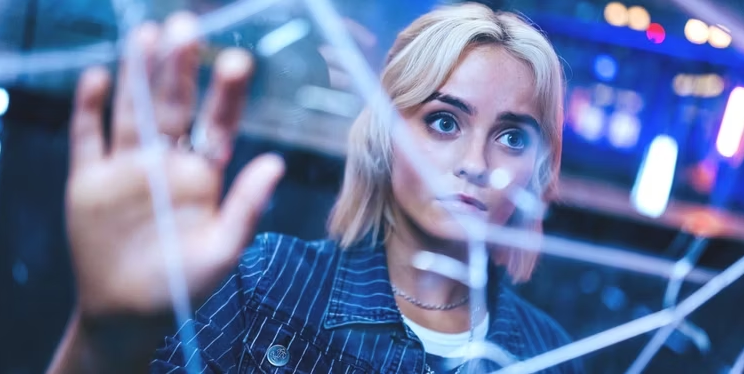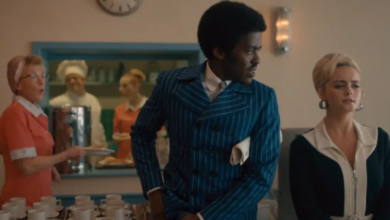Doctor Who Series 14 Finale Review: Is it the End or the Beginning?

Every Doctor Who season finale is a big deal. TV season finales are supposed to be massive, and when the show is dealing with the forces of time and space, anything less than that would seem underwhelming. The Series 14 finale, “Empire of Death,” is no exception. Its main event is so big that it seems like future seasons will never be able to top it. Unfortunately, the gigantic stakes are undermined by some of the same flaws that plagued the first half of the story.
“Empire of Death” picks up exactly where Doctor Who Series 14, Episode 8, “The Legend of Ruby Sunday” left off. Audiences do finally learn the identity of Ruby’s biological mother, and they are rewarded with a boss battle between The Doctor and Sutekh that befits the slaying of a god. Yet everything underneath — the little things that have made the show timeless in the first place — never reaches those same heights. In absolutely swinging for the fences, the finale comes up short and makes the first Disney+ season seem like a warm-up for the next big thing around the corner.
Doctor Who Delivers a God-Tier Boss Battle, Literally
“The Legend of Ruby Sunday” revealed that Series 14’s main villain was Sutekh, the Egyptian God of Death — but most Doctor Who fans had already seen that coming well before he popped out of the TARDIS. While Sutekh hadn’t appeared on-screen, he’s been part of Who canon in audio dramas and other releases for years. That wasn’t necessarily a deal-breaker, as long as the character’s first TV appearance delivered the requisite coolness. And it did… but not from him.
Due to the CGI effects, Sutekh himself continues to just not look that frightening for any reason other than his massive size. Even the people he possesses aren’t that scary, because it’s easy for viewers to see where the makeup ends and the actors begin. The final battle is interesting due to the reactions Sutekh provokes in The Doctor. It becomes less about the villain and more about The Doctor having a sort of existential crisis. Seeing the great symbol of Doctor Who, the TARDIS, used as a weapon of evil is unsettling to everybody. And then the script essentially recasts The Doctor as the villain, since it was hitching a ride on the TARDIS that allowed Sutekh to unleash his evil plan and lay waste to worlds far and wide. Does it get any more dark than making the hero of the show an unintentional mass murderer?
The Doctor: The universe has come to a halt. And it is my fault. I traveled to all those words. I thought it was fun.
Viewers’ mileage on this metaphysical subversion of The Doctor may vary. The first 30 minutes of “Empire of Death” especially are depressing, and they feel just slightly like saying one of the Doctor’s defining elements — the weight he carries from all the loss he’s suffered and seen others suffer — isn’t actually his fault because he’s had an evil god following behind him all this time. Give Russell T Davies credit for startling the heck out of fans with disaster movie-level scenes of UNIT, London and then Earth being wiped out, but those who are drawn to Who for the adventure and the action won’t be satisfied until the last act, when the finale becomes about engineering a way to drag Sutekh back through time again. Seeing The Doctor stop a god using essentially a bungee cord, a glove and a whistle is pretty awesome and reminds viewers that he has tools other than a sonic screwdriver.
Did Doctor Who’s Reveal of Ruby’s Mom Satisfy or Disappoint?

Almost as important to the Doctor Who Series 14 finale is the reveal of Ruby Sunday’s mom — the answer to the mystery that had been teasing fans all season long. In “Empire of Death,” thanks to the wonders of DNA (and a reference to “73 Yards” villain Roger ap Gwilliam), Ruby is able to identify her mother as Louise Miller. She, and the viewers, learn that Louise became pregnant with Ruby at 15 by another teenager and went on to enjoy an ordinary life as a nurse. That’s it; she has no greater significance in Doctor Who canon. And the mystery of who or what she was pointing at? That was just her noticing the Ruby Road street sign and naming her baby.
It’s a very mundane ending to what seemed like a universal mystery, and The Doctor literally explains it by saying that “she was important because we think she’s important.” The underlying message is clear: ordinary people have the power to change the universe, too. And there’s something charming and noble about that. But akin to the battle with Sutekh, anyone expecting something epic like how Jenna Coleman’s former companion Clara Oswald was the Impossible Girl will be disappointed. All of the build-up about Ruby’s mom, and then by extension the idea that Ruby herself had some major significance, is distilled down into a relatable story about finding family.
The Doctor: In the end, the most important person in the universe was the most ordinary.
“Empire of Death” also tries to take two different paths when it comes to Ruby and her mother. There’s a scene in which the Doctor and Ruby watch Louise from outside a coffee shop, and the Doctor urges Ruby to leave her alone, suggesting that the show is going to go the angsty but understandable route. This is immediately followed by Ruby walking into the shop and ordering coffee as a way to very obviously draw her mom’s attention to her. From then on, it’s a whirlwind happy ending: Ruby and Louise reconnect, Louise meets Ruby’s adoptive family, and Ruby may even meet her biological father. This would be a perfect — if rushed — sendoff for the character except it’s already been confirmed that Millie Gibson isn’t leaving Doctor Who. Therefore the great, sad sequence of Ruby saying “I love you” to the Doctor and watching the TARDIS disappear doesn’t have the same impact, because audiences know it’s not really the end.
Doctor Who’s Series 14 Finale Has Highs and Lows

One absolutely clear thing about the Doctor Who Series 14 finale, and the season in general, is that it was made with love. It’s very clear how much appreciation and admiration Russell T Davies has for the world and its characters, based on how many references to and faces from the past he has incorporated. But by utilizing all these ties to the past — from Sutekh to the returns of Kate Stewart and Mel Bush to bringing up Susan Foreman and so forth — there becomes a missed opportunity for this Doctor Who season to make its own statement. It was a clean slate with a new Doctor, new companion and new home on Disney+, but the season winds up being about the Doctor’s past. It feels like a prologue to whatever’s coming in Series 15.
The Doctor: What happens if you bring death to death? You bring life.
And some of those returns don’t work out; Kate is promptly killed off near the start of “Empire of Death,” and Mel’s function in the finale is solely to be possessed by Sutekh to create another not-quite-surprise for the Doctor — only for both of them to be restored, along with Susan Twist’s one-time villain Susan Triad and everyone else, when the time vortex undoes everything at episode’s end. The conclusion of death being pulled backwards to create life is somewhat deus ex machina, although in fairness to Davies, going as far as he takes the finale does require a fantastic resolution — one does not restore an entire universe without something gigantic, though part of the episode hinging on a spoon is a nice touch.
Then there’s the coda, with Mrs. Flood reappearing to serve as narrator, and having to spoil the audience’s joy at Ruby’s happiness by telling the camera that The Doctor is about to face “absolute terror.” This is cliffhanger syndrome at its finest — the script can’t simply leave viewers in a good place. It feels compelled to tease the next thing rather than appreciate the moment. That’s not Davies’ problem; that’s an overall problem with TV in general, rearing its head on Doctor Who. But it is another example of how “Empire of Death” falls short. From both Sutekh and the Doctor having to explain what things mean in monologues, to the reveal of Ruby’s mom, to the underuse of Kate and Mel, there’s so much in the episode that could have been stronger. The big beats are there, the universe is saved, but the joy and wonder that was evident at the start of Series 14 isn’t there at the finish.





